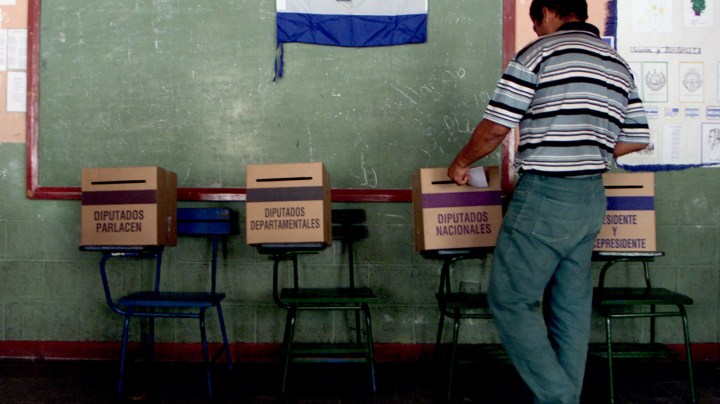2 Opposition Groups Joined Forces to Challenge Nicaragua’s Daniel Ortega

A voter casts her ballot at a polling station November 4, 2001 in Managua, Nicaragua. Photo by Max Trujillo/Getty Images
The Civic Alliance for Justice and Democracy and Blue and White National Unity joined forces on Friday to forge a potential new path in Nicaraguan politics. For years, the two opposition groups have acted separately to fight for justice and democracy. Now, they will collectively be known as the National Coalition. Their primary goals are “maximum inclusion,” as well as a tectonic shift in political culture, according to Havana Times.
“We want to recover that respect for the blue-and-white flag in the sense that no political party’s flag is above the national flag,” said Felix Maradiaga, spokesperson for the Coalition and member of National Unity. The hope is to organize and consolidate by next month.
“Along with the new Nicaragua that we’re going to reconstruct, a national political organization is needed,” he added.
In and of itself, the success of the Coalition, political analyst Eliseo Núñez tells The New York Times, is largely dependent on electoral reform, though – a detail Gustavo Porras, president of la Asamblea Nacional, reportedly wants the current administration to handle.

In addition to that minor/major detail, Ortega’s government still threatens a safe way of life and free thought. Although his recent refusal to grant citizens an early election allows for more planning time, thousands of Sandinista paramilitaries, responsible for injuring and killing civilians during rampant protests over the last few years, are still armed and active.
Disarming them and replacing the electoral court is key. “If not,” Núñez said, “they will be the most violent elections in the history of Nicaragua and probably of Latin America.”
February 25 is the fluid deadline for the coalition to be confirmed and formally recognized. Fluid porque the main goal is that a solid, powerful union is formed, no matter the date attached to its birth.

“What we want is for the coalition to reach its objective of maximum inclusion,” a Coalition spokesperson said. “The important thing is that it be a solid, representative, inclusive and democratic coalition.”
The 2018 protests inspired neighboring and other Latin American countries and ushered in a wave of unions and opposition movements, including the two aforementioned opposition groups. As the 2020 legislative agenda unravels, it’s worth keeping an eye on the National Coalition to decide whether this too could live as a byproduct of Nicaragua’s blueprint for meaningful civic uprisings.